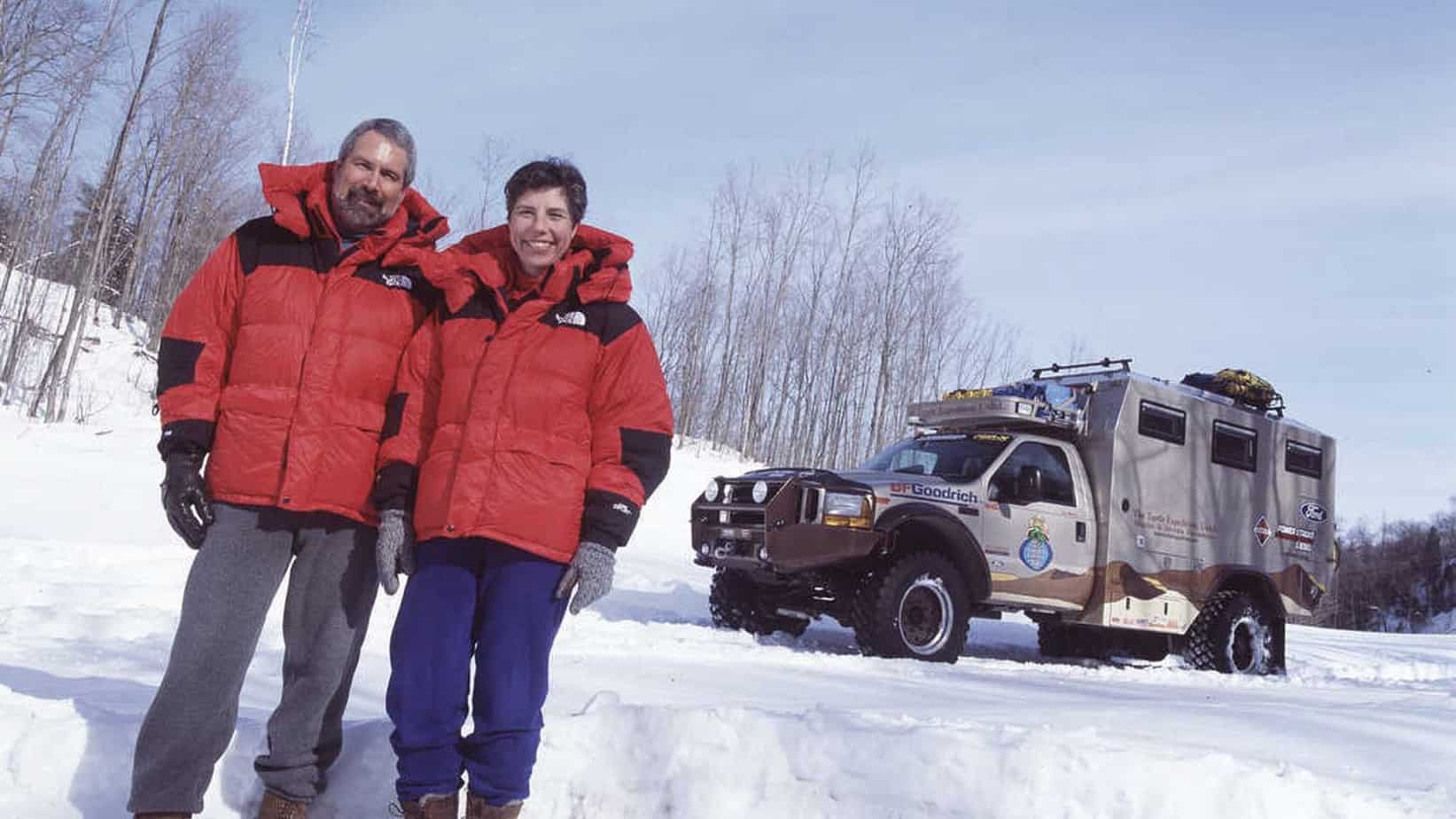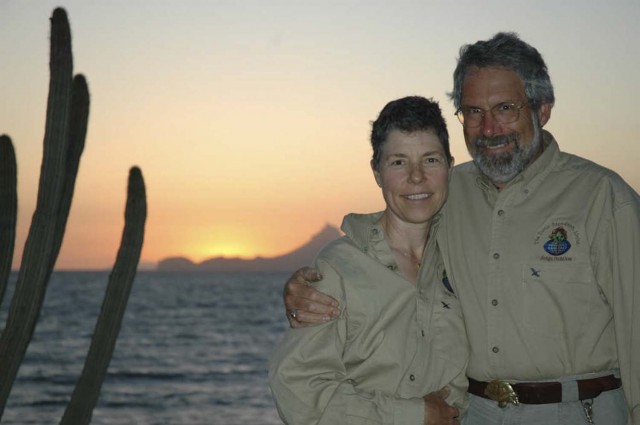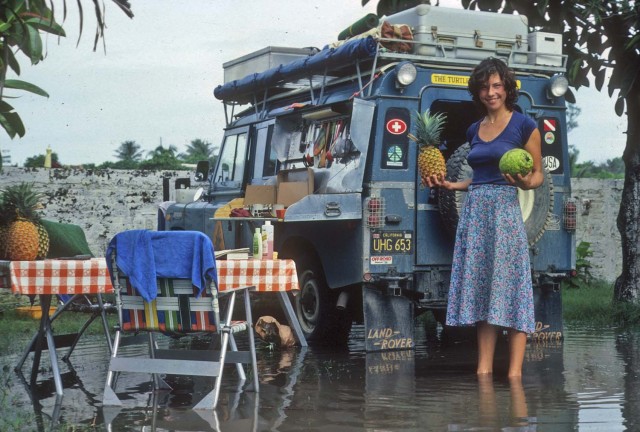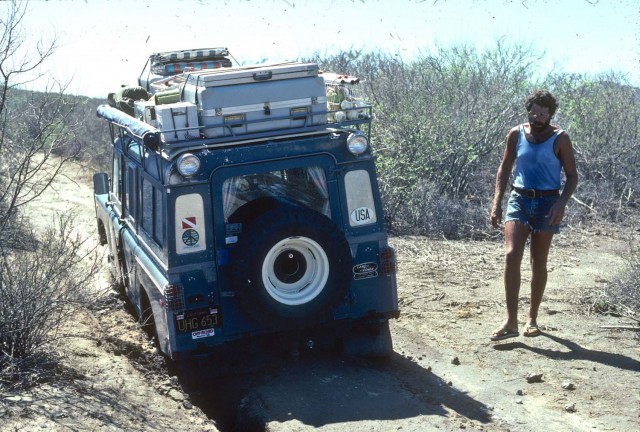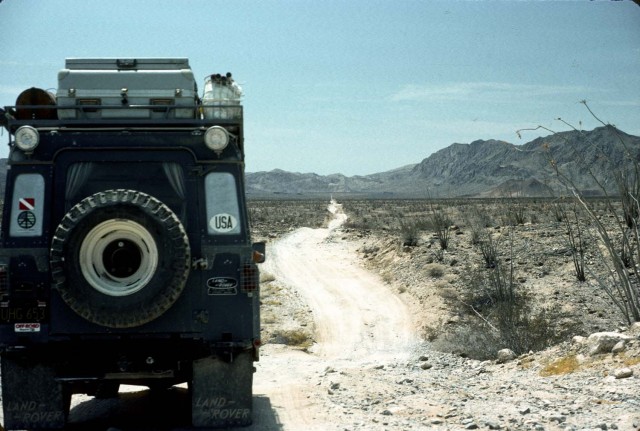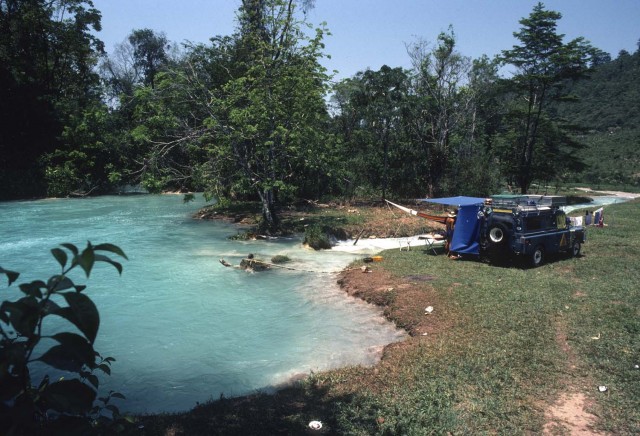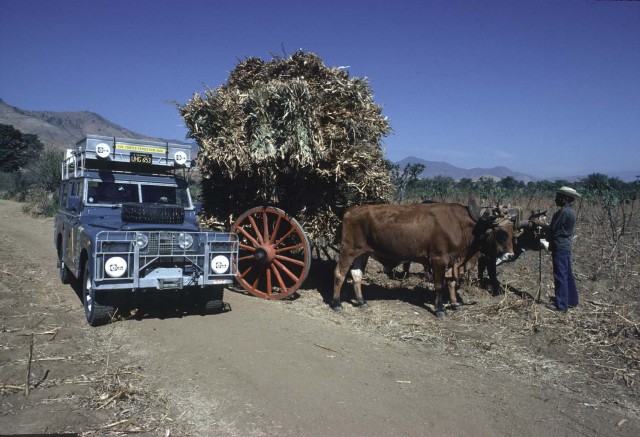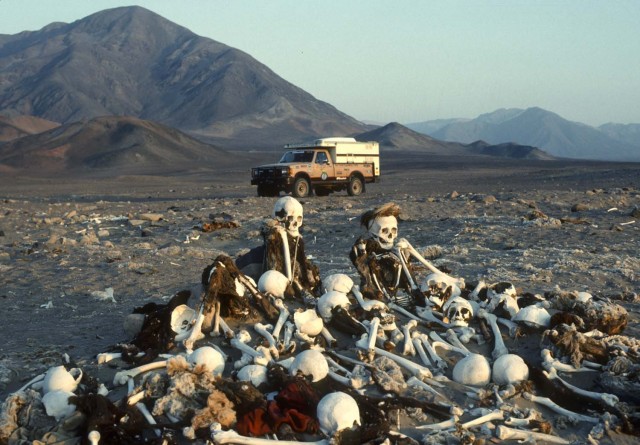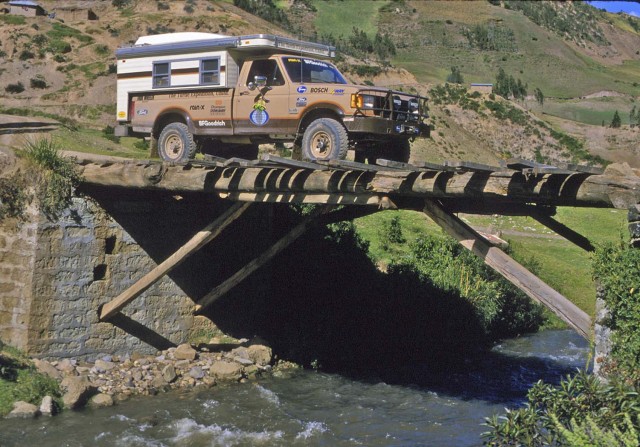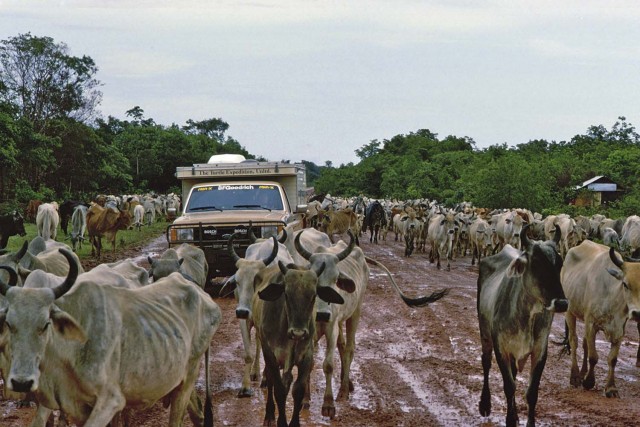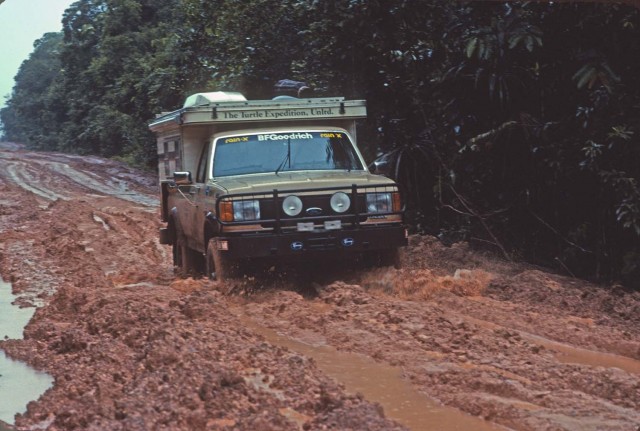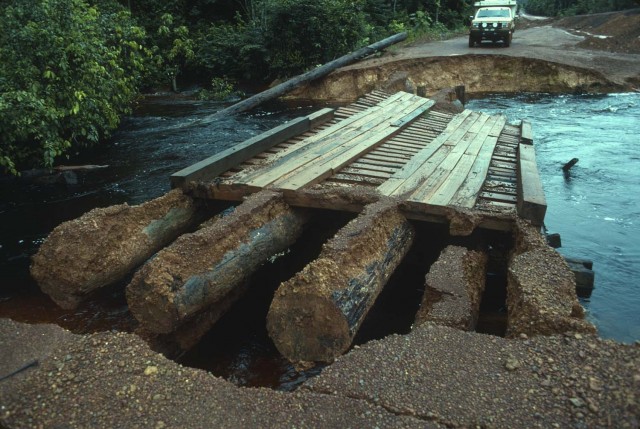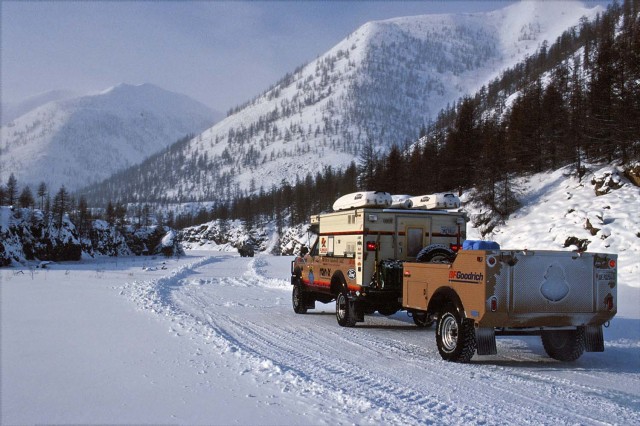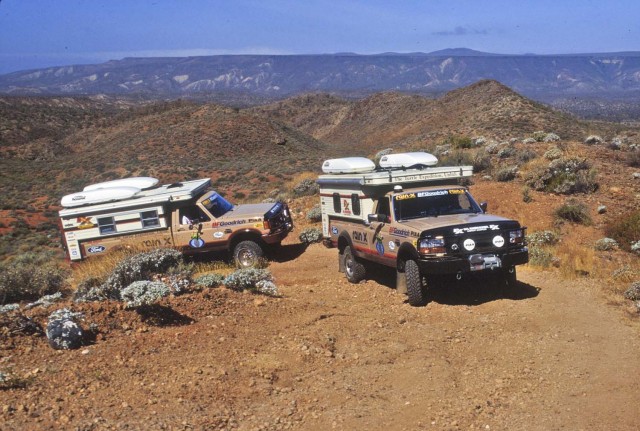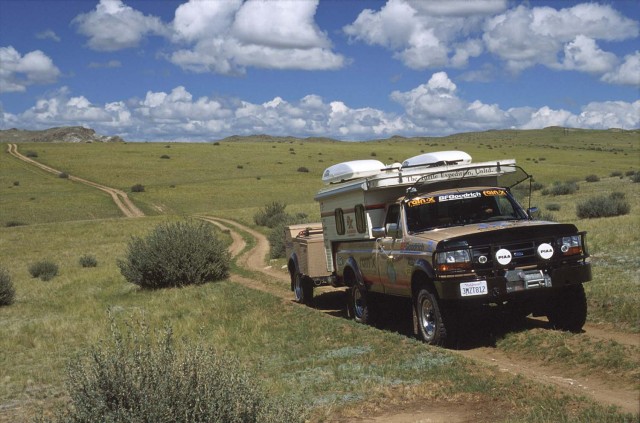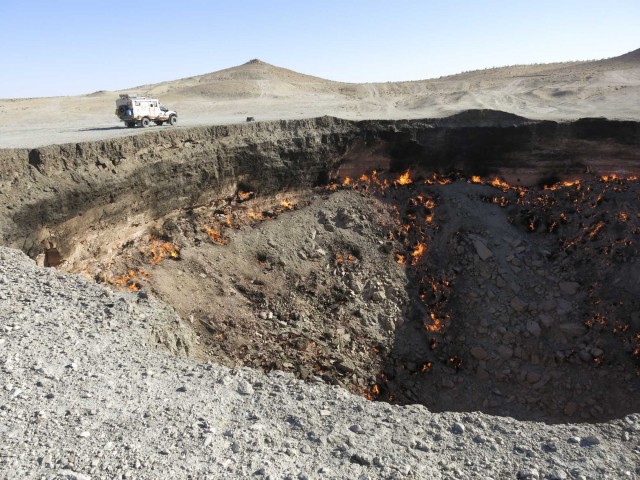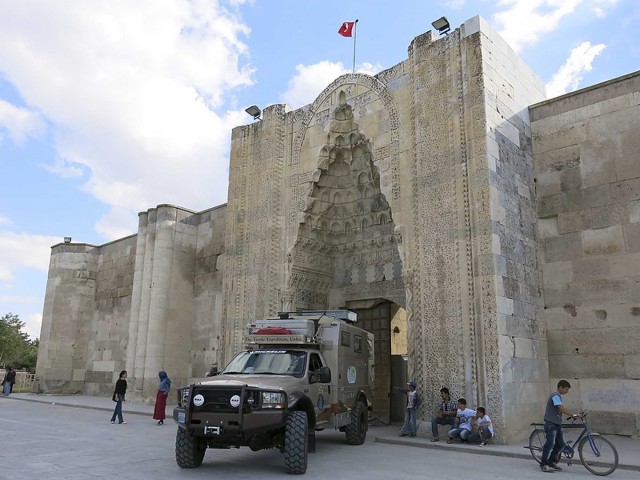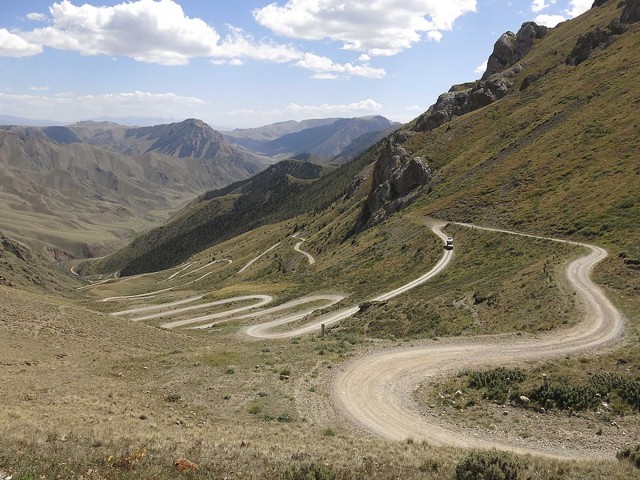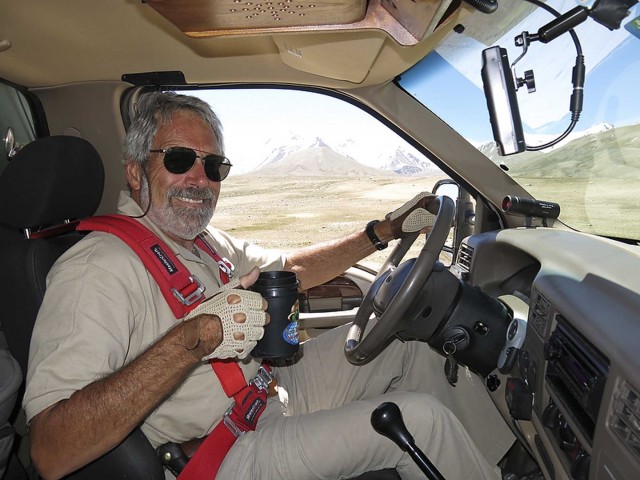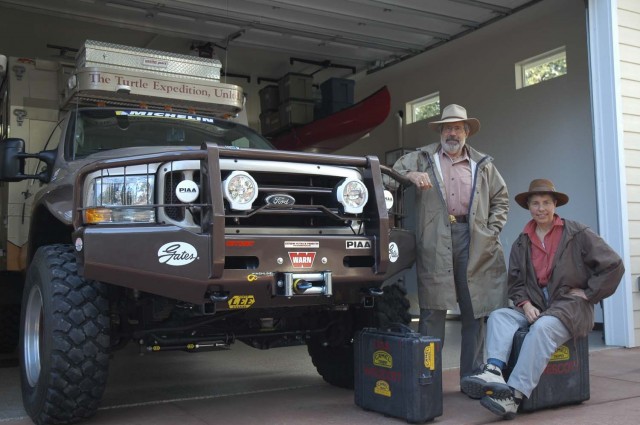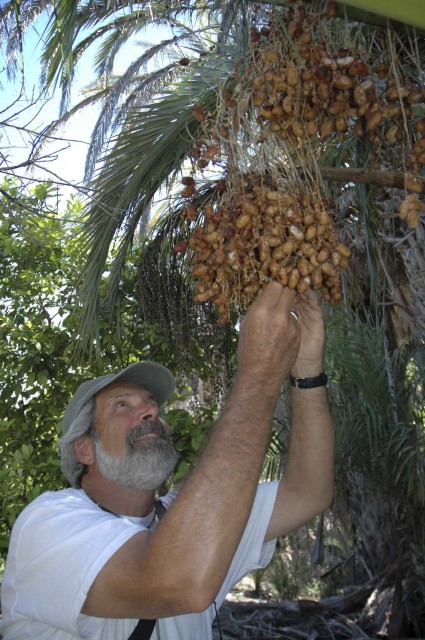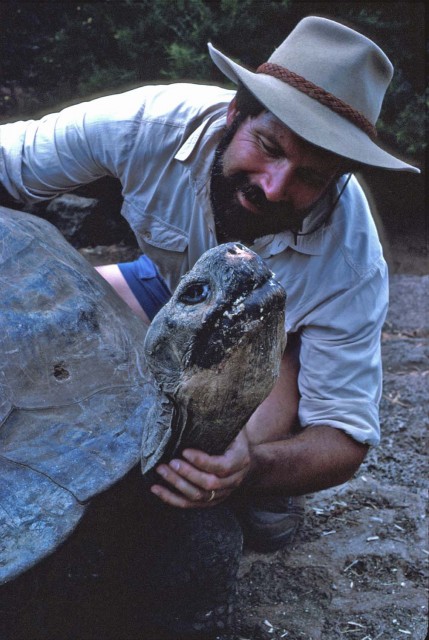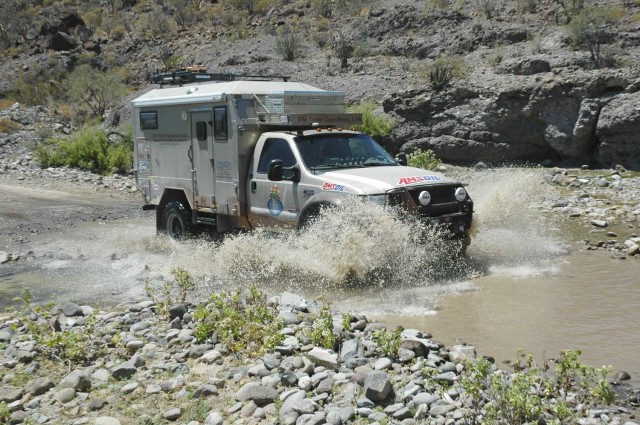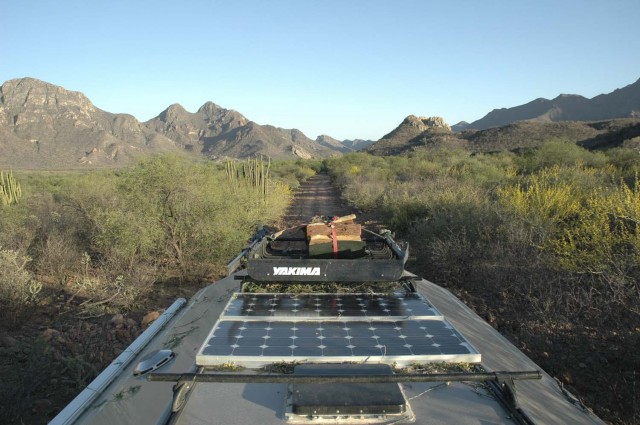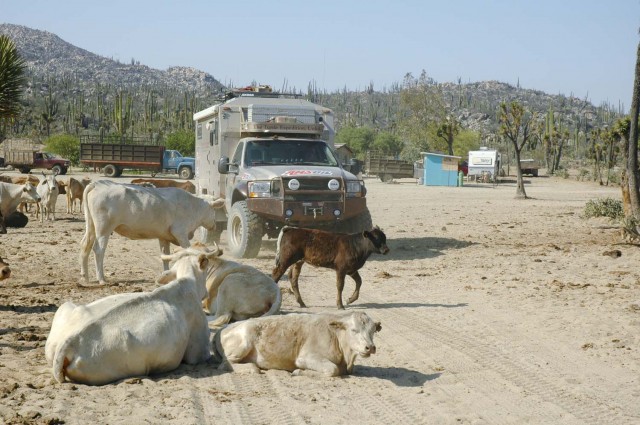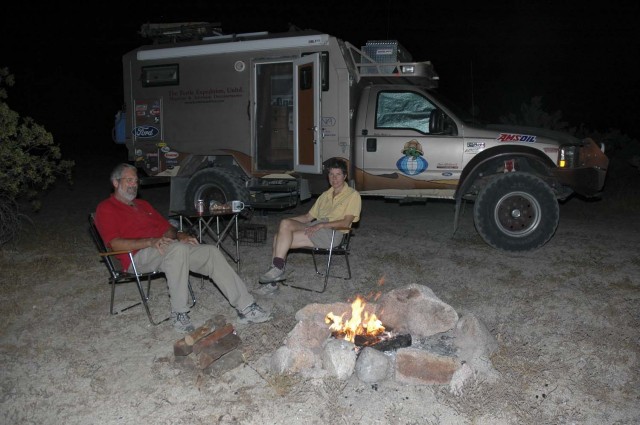It was during the early 80s that I became aware of the Turtle Expedition. Each month I’d wait for my new copy of Four Wheeler magazine in anticipation of reading what part of the world these modern-day nomads were exploring. By the latter part of the decade I’d followed the Wescott’s travels through North, Central, and South America, and dreamed of one day turning my contemplations of travel into reality; maybe even a business, as the Turtle Expedition seemed to have done so well. Pipedreams…
When I finally met Gary and Monika Wescott at the SEMA show sometime in the early 90s, my epiphany was that they were just normal people, rather than possessing the untouchable deity status we so often associate with celebrities. It was inspirational to discover the reason they were who they were, and did what they did, was because they’d made a conscious decision to live that life.
In the world of overland travel there are but a few dozen names that have risen to international recognition; Gary and Monika rank high amongst this honored club. It’s not merely because they travel, but because they have inspired millions to break away from the television and see the world for themselves─whether it be the high peaks of their own backyard or a remote two-track in Guatemala.
I met with them at their Nevada City, California home after they returned from a 2-year, 40,000-mile, turtles-pace trek through Europe and Asia. It is with pleasure I introduce you to Living Legends Gary and Monika Wescott.
The two of you have been traveling most of your lives. Is this a family trait?
Gary: When I was 10 or 11 years old my mother and stepfather moved to Mexico. We hooked up an 18-foot travel trailer to a 1955 Chevy Nomad, drove to Chapala, and rented a house. I learned Spanish on the street. I had my dog, a horse, and a burro. I could do anything or go anywhere I wanted to. It was like being Tom Sawyer in the modern world. It was a dream life for me.
Monika: I think I was born a traveler. My parents were Swiss and lived in Morocco for seven years, where I was born…then we moved back to Switzerland in a VW Bug when I was three. Traveling to a foreign country was no big deal. From where I grew up, Germany was 15 minutes away, and Austria and Lichtenstein just an hour. As soon as I could read, my favorite books were stories about other cultures. My first “adult” travel books were James Michener’s Afghanistan and Leon Uris’ Exodus, which I found in my parents’ library. I had caught the bug.
My first real adventure was to La Rochelle, north of Bordeaux, France, with four 16-year-old friends. One had been an au pair there the year before and we stayed at the family’s beach house. My dad wrote me a letter and addressed it with “Mis liebs Zigünerli” (my dear little gypsy). He must have known something then.
How did you meet?
Gary: I was heading for South America in my Land Rover with a male companion—which wasn’t ideal. Monika and a girlfriend, who had been working as exchange teachers in Minnesota, were in Baja California looking for the sun. We’d stopped at the Hotel Serenidad near Mulegé to clean up the Land Rover, take a shower, and restock supplies as we’d been camped on the beach for three weeks. After the tourists went to bed we were sitting around a table with the girls exchanging stories and singing songs. As it happens amongst travelers, questions came up like “What are you doing?” I said I was driving to South America. Monika said “Oooh,” and I said, “Want to come?” She replied, “Yeah, maybe.”
The next day we went south to a beach called Playa Requesón, where we stood waist-deep in 80-degree water, picking up clams with our toes and talking more seriously. Monika decided to come with me on an adventure that would eventually last a lifetime.
Tell us about your first overland trek together.
Monika: After I met Gary I returned to Minnesota, packed up my stuff and flew to Tucson, Arizona, where I took a bus to Guaymas, Mexico, and then a taxi to San Carlos. I was to meet Gary in front of the local disco at 10 p.m. Our agreement was to travel for three months to South America and see what happened. After two months in Mexico he asked me if I was staying. I told him, “We haven’t made it to South America yet.”
Gary: When Monika returned we camped for a few days on a remote beach near the movie set of Catch-22 before packing up the Land Rover and heading south. Not realizing it at the time, we were already overlanding, hopping from beach to beach down the Pacific. We caught fish, lived the simple life, and didn’t spend a lot of money. As I recall, all expenses, including fuel, a couple of beers a day, drinking water, fruit, vegetables, and dry goods, were about $25 a week. It was an ideal life at the time.
At what point did you realize that world travel was no longer a pipedream and would be a way of life?
Gary: I attended San Diego State as a pre-med major; I was going to be a veterinarian. I then switched my major to photography. Having been editor of my school newspaper, yearbook, and the school photographer, I’d had always been interested in writing and photography but up to then I’d never considered it a vocation. During my second year I worked part-time, and as I began to get cash in my pocket, other ideas developed. My roommate and I were going to fly to London, buy a couple of Trident Triumph motorcycles, and ride. That idea washed away when he got married. I’d also had thoughts of becoming a pilot.
During a time of transition I lived in a commune where I met a couple that had been to Nepal. Intrigued with this, I sold my motorcycle and jumped on an airplane. I made it as far as Afghanistan, that’s another story, but that trip was the beginning of an addiction. I returned to the U.S. still looking for direction, and moved to Sunriver, Oregon to teach swimming. I met a girl named Joy and we made plans to go to Europe. We started a company in Turkey to import sheepskin coats, handbags, Meerschaum pipes, and puzzle rings. By the time we got through dealing with import customs we realized that we were prostituting ourselves for travel. We moved to South Lake Tahoe where I got a job in a ski shop. We saved our money, paid off our bills, and bought a Land Rover with the idea of driving to Nepal.
Monika: I graduated from the University of Zurich as an elementary school teacher, and after teaching for a year in Switzerland I was ready to spread my wings and explore the world. There was an organization in the U.S. called Amity Aid that hired German, French, and Spanish teachers to work with foreign language teachers in high schools. My assignment was in Anoka, Minnesota.
I kind of slid into this way of life and never really thought much about it. I always knew I could slip back into “society” without missing a beat. My choices were either a conventional life with a secure job, a good salary, maybe marriage and kids, or a gypsy life with Gary. The gravitational pull of adventure was too strong and exciting.
Why did you decide on a Land Rover for an expedition vehicle?
Gary: After being on the road for three months, traveling with a backpack through Western Europe, Turkey, Iran and Afghanistan, I was tired of buses, trains, and hitchhiking. While sitting in the famous Pudding Shop Café in Istanbul I realized there were three things I needed: my own music, a travel companion, and my own form of transportation. A couple pulled into a park across the street in a Land Rover and popped up the Dormobile top. A Land Rover was the obvious answer.
I bought the 109 from a used car lot in San Francisco and spent a year and a half customizing it into a self-contained camper. It went through several changes, including a new engine, two custom roof racks, and an army utility trailer. The Land Rover was a great vehicle, but it was still basically a highway-legal tractor—even after putting in a Chevrolet engine and a Fairey overdrive. But it was a Land Rover with a tire on the hood. If two of them were parked together it looked like an expedition.
How did the 109 get its name?
Gary: While I was in South Lake Tahoe preparing to leave for South America people would ask, “How long you will be gone?” Expecting the answer to be a couple of weeks, they were amazed when I said three to five years. The old blue Land Rover had been deemed La Tortuga Azul, or The Blue Turtle, and the trip to South America became so outrageous it had to have a name. We called it The Turtle Expedition, Unltd. We traveled very slowly with our house on the back, and had unlimited time. The analogy fit.
You later switched to a gas-powered Chevy pickup and then a Ford Diesel. Why the change?
Gary: After several years of exploring Mexico and Central America, we realized we needed a place where we could occasionally go inside and close the door. I’d been writing for magazines in the U.S. and my articles were appearing almost monthly. We had a following by then, and with that following came my ability to create exposure; at least enough to get product sponsorship. We returned to California and bought a gasoline powered Chevy pickup truck. That was the start of a long learning process.
The engine did not like Mexican fuel, and we went through several modifications and changes in an attempt to fix the issue. We designed our own camper before we discovered Four Wheel Campers. At the time, one of their pop-up campers seemed to meet our needs. They helped us modify a Keystone designed specifically for two people. It had a comfortable bed out of the weather, a kitchen to cook healthy meals, a good sound system, and we could stand up inside and close the door. It didn’t have a bathroom; we had a shovel and a portable toilet seat that worked outside behind a bush or, in an emergency, in the camper over a trashcan and plastic bag. As a side note, we’d also come to the realization that if you’re traveling with another person in a small camper in a third world country and can’t go to the bathroom in front of them…you probably have a much bigger problem.
The fuel issue prevailed—we’d still not gone to South America—and we finally realized the Chevy wasn’t suited for where we wanted to go; places where low-grade fuel was the only choice. We sent a proposal to Ford for a four-wheel drive diesel pickup and they accepted. We soon had a new Ford with a 6.9-liter Navistar engine, The Turtle III.
Traveling can be expensive; how have you financed your trips?
Gary: In the beginning it was self-financed. The Land Rover was paid for and we had no house, no children, no pets and no bills. We had a fairly stead income of $600 to $700 a month. That’s not bad when you’re only spending $25 a week.
There were times we spent more, such as when we rented a small house in Pátzcuaro, Mexico to get out of the rainy season and get off the road for a while. I need to point out that we were never in a hurry. Following the advice of John Steinbeck and his classic book Travels with Charley, we weren’t taking the trip. The trip was taking us.
Since sponsors provided most of our equipment, we didn’t have to buy things like tires, oil, or other travel gear. We were now getting guaranteed exposure in major 4WD magazines, typically a four- to six-page article with a two-page spread or maybe even a cover. That kind of exposure for a company like BFGoodrich would cost thousands of dollars. Companies started to notice and our larger sponsors began to finance our trips. I had a basic rule; every time a product appeared in a magazine we’d send a copy to the company involved. We’ve done this for 40 years and it has given us a reputation of giving back more than the company provided.
What was your motivation in covering international events such as the Camel Trophy and Baja 1000?
Gary: I covered the Camel Trophy in Australia, Madagascar, Russia, and Brazil. As a U.S. journalist I was able to participate in the training programs at Eastnor Castle in England and again in France; it was a lot of fun and a good education. In the Baja 1000 we were not driving but co-piloting, and participating in the sport to help promote BFGoodrich tires. We also covered most of the four-wheel drive events all over the country. I don’t consider myself a four-wheeler and I don’t even like the term “off-road,” as we always follow roads. They may be bad roads, but they are roads.
Has turning your passion into a business detracted from the excitement?
Monika: When one of your passions becomes a business—in our case travel—you have to be careful that you don’t lose the excitement. While traveling fulltime and writing articles for nearly four decades, we sometimes grew tired of taking pictures and purposely left the cameras (work) at “home” (in the truck/travel trailer) and just experienced things with all our senses and our hearts. Photos may be missed, but those experiences are stored in our memories. On our most recent adventure, the Trans-Eurasian Odyssey, which included the famous Silk Road, we were mostly taking photographs and notes. In the next few months, blogs will continue and articles will be written about the journey. But there was no pressure, no contract, and no deadline to push us. This journey was for us and secondarily for others to experience it through our eyes.
Gary: As a friend once told me when I was at Four Wheeler Magazine, “Photography is like prostitution. First you do it for fun, then you do it for a few friends, and finally you do it for money.” That’s dangerous, and I was determined not to turn travel into prostitution. But as sponsorships increased so did our obligations. In a way it did detract from the freedom of letting the trip take us. On the other hand, because we had a good following in the magazine, it didn’t matter where we went. Readers just wanted to know where we were going next. Although the excitement and anticipation of planning a trip like South America or driving across Russia was intermixed with obligations, there were always fun times involved. The Trans-Eurasian Odyssey was a very busy adventure, sometimes driving every day through so many countries, but I can’t really call it work. We could still stop anywhere that looked inviting for an hour or a day, take out the chairs, make a cup of coffee and relax in the sun.
The Turtle V is a highly modified Ford F550. Is it the last in the Turtle line?
Gary: That’s hard to say. Overall we’re extremely pleased with the way our one-off custom European-style camper functions. There is just one thing that I can say about building a Turtle VI; I will never do it myself. It must be designed on a computer (CAD) and built by engineers who’ve done 40 or 50 of them—they’ve already made the mistakes we would otherwise make.
Have newer hi-tech vehicles made life easier or complicated things?
Gary: Certainly, our newer high-tech vehicles have made life easier. Things like GPS, inverters, and digital cameras have simplified life on the road. On the other hand, our old Land Rover had two fuses for the entire electrical system. There are many days when I think that might be better.
You just returned from the Trans-Eurasian expedition. How has that region of the world changed since you were there last?
Gary: As you know, we just returned from a 2-year, 40,000-mile, 26-country expedition around the world. We followed the Silk Road and drove from the Atlantic coast of Portugal to China’s Yellow Sea, wheels on the ground. Europe was amazing; the museums, cathedrals, magic cities, and no-hassle border crossings. Yes, there are legal ways around the three-month Schengen Agreement. I had a special permit from Switzerland, but in a year of travel through Belgium, Germany, Czech Republic, Switzerland, France, Portugal, Monaco, Italy, and Greece, no one ever asked to see it. (This may have changed after the Paris attack.) Most of Western Europe is so steeped in history, very little changes aside from the constant renovation of some major sites like the Parthenon. I was shocked at the unbelievable amount of money (resources) and human labor that had been invested over millennia on churches, cathedrals, castles, and fortresses in the name of one god or another, or to protect their often ill-gotten fortunes of one ruling family.
Once we entered Turkey and crossed the Bosporus into Asia, everything changed and every country was different. Many are still emerging from years of Soviet control. Big cities are always big cities. In the countries of Georgia, Azerbaijan, Turkmenistan, Uzbekistan, Tajikistan and Kyrgyzstan, and even China and Mongolia, many live happily without running water or proper sewage systems. If you never had it you don’t miss it. Russia is an emerging culture, constantly striving to be more Western while still under the near-dictatorship of Putin. Better roads and the absence of GAI (road police) was a relief.
The ultramodern South Korea was a new experience, with the fastest Internet in the world and probably more “clean” public restrooms than any place in Europe or the U.S. (something travelers will notice.) Japan was a challenge to get around without our expedition camper. It was interesting to experience another form of overland travel.
What has not changed in all of these countries is the warmth of the people. Neither politics nor religion ever became an issue. People were friendly, hospitable, and genuinely pleased that we had come all the way from California to visit their country. It verified what we have learned from 40 years of overland travel. “Our hearts beat the same.”
Is there a secret to preparing for border crossings or checkpoints?
Gary: The first thing is, don’t be in a hurry. The second is to be clean, neat, and polite. The third, aside from having all your paperwork in order, is don’t volunteer anything. It’s also important to let third-world officials politely understand that you know what they’re supposed to be doing. As soon as they realize this, the situation often changes. We’ve also discovered that it’s always better for the woman to go out and deal with a male border guard. This technique did not change even in Moslem countries.
Monika: If at all possible, Gary stays behind the steering wheel and I get out to open storage boxes or the camper. It creates a different dynamic and the “macho” factor doesn’t come into play. The soldier is usually very young and has a family back home; I represent his sister, his mother, or his grandmother.
Also, NEVER volunteer anything. What’s in this box? Clothes and camping equipment. Can you open it? Sure. Please open it. Open only one thing at a time, pack everything back up, close or lock it, then go to the next box or drawer. I never let more than one customs agent into the camper at a time. No cigarettes and no guns inside; remember that this is your home. Be polite but firm, I’ve never had any trouble this way. Lastly, be patient and play their game. We always resist bribes. Sometimes a hat or a small souvenir at the end is enough. Giving a bribe just sets it up for the next traveler.
Have there been any sketchy moments, security issues, or close calls?
Gary: Surprisingly, after over 40 years of travel, often in third world countries, we’ve had very few scary moments. There’ve been the occasional run-ins with drunks, and a few white-knuckle close calls on the road, like driving on thin ice on the Lena River. We’ve woken up in the morning with a brown bear sitting on the back of the support trailer trying to figure out how to get to the food inside our camper. We’ve also been awakened in the middle of the night by two Russian guys in Moscow climbing on the back of the truck trying get into our storage boxes. There have been other moments of tension, which now almost seem humorous. At the time they were very exciting, but I can’t say that our lives were in danger.
Monika: That said, Gary once yelled at a rich Mexican who was driving his ATV up and down the beach above the high tide mark. He got mad and came back with a bunch of friends; some of which looked like they might be Federales in Hawaiian shirts with guns on their hips. The atmosphere was quite hostile and scary for a little while, but eventually Gary apologized and they shook hands. Headed into Islamic countries, I was a little apprehensive at first, but then pleasantly surprised as they all showed much respect towards me. We were guests of their country and that needed to be honored. As foreigners, we are different and you can only blend in so much, mostly not, so we always make an effort to find out as much about local customs as possible. Dressing appropriately is crucial for both sexes. In the ex-Soviet Islamic countries I did not need to cover my head. It’s really quite easy. I just observe what other women wear. There is no reason to offend anyone due to carelessness and insensitivity, but faux pas can happen just the same.
What are the downsides of being gone for several years at a time?
Monika: People often ask: Don’t you miss home? Where is home? Switzerland? California? As nearly every immigrant will tell you, we are neither fish nor fowl, at home in both places and yet nowhere. My home is where my heart is. I like and appreciate nice things, but I don’t have to have them around me. I can easily navigate through a five star hotel or a fisherman’s shack. For me, that’s the spice of life. You just switch your hat. The more you do it the more comfortable you get.
The grass is always greener on the other side of the fence. While our lifestyle may look exotic, we have also given up a lot socially. We opted not to have children or a dog, and didn’t own a house for a long time. When we were finally able to financially afford one, it was rented seven of the first eight years.
We don’t see our families often. We’ve missed holidays like Thanksgiving and Christmas, and important family celebrations. I can’t call my sister and say, “Hey, let’s meet for a cup of coffee.” We also gave up “job security,” whatever that means. It did, however, set us free to take responsibility for our lives, for our actions, and it let us create a unique lifestyle. It wasn’t always easy, and certainly is not for everyone. One thing we can say is that whenever our last day comes, we have lived life to the fullest. I encourage everyone to strive for the same.
What draws you back to the road?
Monika: What draws me back are the people, their customs, cultures, heritage, and philosophy about life, as well as the beauty of landscapes, nature, and art. Travel broadens your horizons and you realize that people are people all over the world. Their main concern is living a decent life, hopefully better than what their parents could offer them, raising children to adulthood, keeping a roof over their heads, feeding them, clothing them and hopefully, sending them to school. Governments are governments, and that’s a different story.
I remember an old veteran in Irkutsk, Russia, who lived near where we had parked for a couple of weeks while waiting for a new fuel pump. Every Friday, the veterans proudly displayed their war medals on their chests. The man walked up to The Turtle IV with his little dog, peeked under the hood, and listened to the conversations; by that time we were able to communicate with locals in a rudimentary way. He then shook Gary’s hand enthusiastically and exclaimed loudly that he was so proud to shake his hand as he had come to realize that we were people just like him. Russians were raised to fear Americans just like Americans were raised to fear Russians. I recently read a quote by Peter Waterman on why we travel. It struck a cord.
“To shatter walls and preconceptions, to be off balance, uncomfortable, and overwhelmed. To remind myself that beneath everything, all people everywhere are the same. To expand my knowledge, experience, and comfort zone in profound ways with the goal of constantly improving myself.”
Gary: That’s a good question and I’m not sure how to answer it. Is it the adventure aspect, or the challenge of preparing for a major expedition like driving across Siberia or around South America or following The Silk Road? Maybe it’s a little of both. Once we are on the road it is many things; the people and food and different cultures. I’ve often thought it’s sort of like breaking out of the gravitational pull of the Earth and getting into space. If you are traveling in your own self-contained camper around the world, you’re always home. If you find a place you’d like to camp for a couple of days, you simply stop. Maybe it’s the newness. Maybe it’s the adventure. Maybe it just gets in your blood.
Have you kept track of the number of countries you’ve visited?
Monika: It’s not in my nature to brag about how many countries I have been to or how many vertical feet I’ve skied that year. I’m not a trophy hunter. To travel and to ski are important, the activity that is, not the number. Remember, we are turtles and travel slowly. Out of curiosity, we did add up the countries and I think the number is 58.
Is there a specific place that you would like to return to?
Monika: There are many places, but the world is so big, so diversified, and so interesting, we usually don’t have time to go back. When we do, however, and we visit with people we became friends with long ago, it feels like coming home. I wouldn’t mind revisiting Chile, Norway, and Alaska in the autumn. But then, we haven’t traveled in Tibet, Southeast Asia, the Indian subcontinent, Africa, Australia, New Zealand, or the South Pole…the wish list is long. Having completed the Trans-Eurasian Odyssey and the Silk Road, we have time to plan our next adventure. Maybe we’ll revisit South America and then ship to Africa for the drive north back to Europe.
Gary: That’s a long list, but we could start with Southern Chile, maybe Argentina, parts of Russia, parts of Spain, or maybe we should just go back and re-hike the John Muir Trail from Yosemite Valley to Mount Whitney. People often ask what our favorite place has been. I have to think for a moment, and then I say “The California High Sierra,” which coincidentally is just a short drive from our home. Looking back, I would love to revisit Tajikistan and drive across Mongolia’s Gobi desert again.
Is retirement in the future?
Gary: Retirement? I looked up the word “retiring” in the dictionary once and one of the synonyms I found was death. In my own sense I retired when I was 29, or at least that’s the last time I worked for someone other than myself. Certainly, writing for magazines is work, and preparing a vehicle for an international expedition is work. Maintaining the truck and keeping ourselves healthy on the road could be considered work. On the other hand I’m not punching a clock. If I want to stop and sit in the sun, I can. Often, when I’m sitting on a beach on a remote coast of Baja California or Greece or Turkey, I realize that this is better than sitting in a cubicle in Los Angeles—otherwise I might have a real job.
I can’t imagine never traveling again. It would be a very sad time in my life when I couldn’t drive to a remote beach or fish camp in Baja and spend a few days eating fresh lobster, clams, and oysters and enjoying the absolute silence of the desert. Only time will tell what draws us back to the road, and what might keep us at home.
Monika: Ah, what’s retirement? I plan on being as active and adventurous as long as possible. There may be a time when I can’t carry a heavy backpack any longer. When that time comes I’ll cross that bridge. You don’t have to travel far to explore something new. We’ll concentrate more on our beautiful Sierra Mountain backyard…or maybe revisit Mexico and watch the sunset on a beach.
Do you have any suggestions for those who wish to experience the world as you have?
Monika: Over the years we’ve met people who’d traveled to many countries, and I’ve noticed a particular group who never have stories to share. It is usually because they stayed at the Sheraton in Santiago, Chile, or any other country, and played tennis or sat around the pool…maybe they left the compound for a shopping spree on the main drag. They tell you they “did” Chile, an actual term we’ve heard many times, but they didn’t explore the country. That may be fine for some, but the cultural flavor is usually missing.
Gary: I have always thought that too many people live in a place they don’t want to live so they can work in a job they don’t like and then take their two-week vacation and visit relatives someplace else that they’d rather not go. I have had the good fortune in my life to be able to choose the places I wanted to live and then find a job. That’s really the way it should be. I’ll never be rich, a relative term, but if life is what you do while you’re waiting to die, I win. When I scan through photographs of what Monika and I have done in the last 40 years, I am positively amazed at the experiences we’ve had. We’ve been so incredibly fortunate to choose this lifestyle. I wouldn’t trade our memories for all the money in the world.
I do have one suggestion. Read The Secret by Rhonda Byrne and perhaps take some guidance from a poem I wrote in 1976 when I had been on the road only a short time.
TRAVELER’S SECRET
The roads of the World,
They serve as my path;
The lakes, rivers, and oceans
All do fine for my bath
My body and soul
Are warmed by the morning sun
As landscapers go,
Nature is second to none
With moon, stars, and clouds
Drifting peacefully overhead,
On fragrant meadow or deserted beach,
I pitch my tent and make my bed
The people of the Earth
Are my gourmet cooks;
Recipes for their dishes,
Ahh, they cannot be found in books
With the fishermen who reap the sea
And the farmers who till the land,
I’ve never been to the market place
Without finding something grand!
And people say, “How can you go,
And leave us all behind?”
I smile or laugh and hold my thoughts;
I know what I will find
How do you get it,
This freedom you have?
(A question people quite often ask)
Cast off your fears, disregard inhibitions;
They’re only an emotional mask
The Secret of Travel,
No matter what you believe,
Is really quite simple:
You just have to leave!
Follow Gary and Monika and The Turtle Expedition at: turtleexpedition.com


